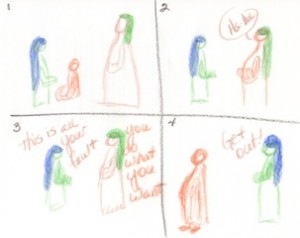Our Circle of the Word program is called “Sacred Stories” so as not to confuse it with another program at the jail called “Circles.” It takes place in a small room at the end of the hall on the fourth floor of the Montgomery County Jail. The story for March 11 was the story of Jesus’ arrest in the Garden of Gethsemane. As I prepared for the class I wondered how it would be for the women to spend time with a story about being arrested. They’ve all been there, at least once.
Six women joined Sharlyn and me on this particular Wednesday. One woman had never heard the story before. The others were familiar with it or knew it quite well. But no one knew the part about the young man running away naked. I assured them even most of the people in my church don’t know that part either.
When I got to the storylearning activity, that I not so creatively call “Repeat-After-Me,” we stood up in our circle. As usual, the women dutifully repeated my words and gestures. And also as usual, the tightness in the room relaxed and smiles began to appear. No matter how serious the story, this activity is always a little silly and always a little joyful. Our version of Judas’ betrayal kiss failed to be remotely tragic.
When I came to the line “Then they laid hands on him and arrested him” I stopped to ask, “How should we show that ‘they laid hands on him’? What gesture should we use?” Several were offered: one hand on an arm, two hands on shoulders. Then someone put both hands behind her back, wrists crossed at the waist. There were murmurs of assent, nods of agreement. That’s the gesture of arrest.
The storyboard exercise entails listening to the story in parts and drawing simple pictures to help remember each scene. One woman drew handcuffs for the episode of Jesus’ arrest, and a heart with a jagged line through it to remind her of the part where all the disciples forsake him.
Sharing life connections with the story is usually succinct and always confidential. Not everyone chooses to speak. But everyone is engaged. Suffice it to say there was mention of feeling forsaken, of being betrayed, and of betraying others.
At the end of the class during a time of feedback, one woman said that it was special to be able to talk with outsiders about their experience. Again, there were murmurs of assent, nods of agreement. I was surprised, because the women hadn’t really said all that much. Nevertheless, through gestures, artwork, and naming connections their experience was clearly voiced and gently heard.
